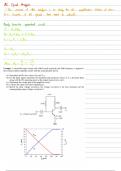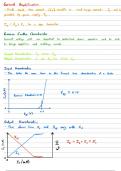Bjts - Study guides, Revision notes & Summaries
Looking for the best study guides, study notes and summaries about Bjts? On this page you'll find 17 study documents about Bjts.
Page 2 out of 17 results
Sort by

-
SEMICONDUCTOR ELECTRONICS: MATERIALS, DEVICES AND SIMPLE CIRCUITS
- Interview • 36 pages • 2023
-
- £14.12
- + learn more
These are the notes used by 100% mark secured student in Kerala State board, A higher secondary board in Kerala, India. Semiconductor electronics is a branch of electronics that deals with the study, design, and utilization of semiconductor materials, devices, and circuits. Semiconductors are materials that have electrical conductivity between that of conductors (such as metals) and insulators (such as non-metals), and they play a crucial role in modern electronic devices. Here's an overview...
A practice question of the basic transistor amplifier circuit. AC signal analysis can be used to study the AC amplifications of BJTs (Bipolar Junction Transistors).
A look at the Bipolar Junction Transistor, including the cutoff, linear and saturation regions.

-
BIPOLAR JUNCTION TRANSISTORS
- Lecture notes • 33 pages • 2022
- Available in package deal
-
- £6.66
- + learn more
BJTs are conducted with three doped semiconductor regions separated by two pn junctions the three regions are called emitter, base and collector

-
BIPOLAR JUNCTION TRANSISTORS (BJTs)
- Package deal • 3 items • 2022
-
- £9.80
- + learn more
In order to better visualize the operation of a BJT as an amplifier, it is useful to represent it by an equivalent circuit. Two types of equivalent circuits representations are used based on h-parameters (Hybrid) and r-parameters. For this course we shall limit our discussion to r-parameters. There are three basic BJT connections

-
BIPOLAR JUNCTION TRANSSTORS
- Lecture notes • 59 pages • 2022
- Available in package deal
-
- £6.66
- + learn more
In order to better visualize the operation of a BJT as an amplifier, it is useful to represent it by an equivalent circuit Two types of equivalent circuits representations are used based on h-parameters (Hybrid) and r-parameters For this course we shall limit our discussion to r-parameters

Did you know that on average a seller on Stuvia earns £76 per month selling revision notes? Hmm, hint, hint. Discover all about earning on Stuvia




